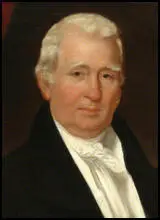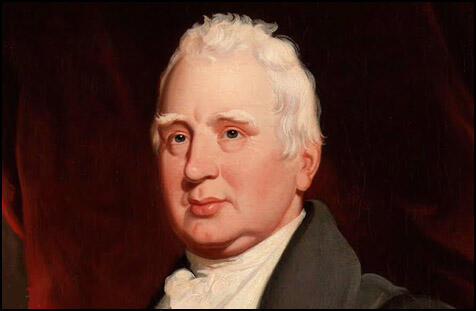William Cobbett

William Cobbett, the son of a tavern owner, was born in Farnham, Surrey, on 9th March 1763. Taught to read and write by his father, Cobbett worked as a farm labourer until 1783 when he moved to London and found work as a clerk. A year later Cobbett joined the army and eventually achieved the rank of corporal. While his regiment was in Canada, Cobbett discovered that the quartermaster was stealing from army funds. When he attempted to expose this scandal he was accused of being a troublemaker. Cobbett, who had recently married, decided to flee to France with his new bride. After seven months the couple moved to the United States where Cobbett taught English to French refugees.
In 1799 William Cobbett returned to England. Three years later he started his newspaper, the Political Register. At first he supported the Tories but he gradually became more radical. By 1806 he was a strong advocate of parliamentary reform. An unsuccessful attempt to be elected as M.P. for Honiton convinced him of the unfairness of rotten boroughs.
William Cobbett was not afraid to criticise the government in the Political Register and in 1809 he attacked the use of German troops to put down a mutiny in Ely. Cobbett was tried and convicted for sedition and sentenced to two years' imprisonment in Newgate Prison. When Cobbett was released he continued his campaign against newspaper taxes and government attempts to prevent free speech.
By 1815 the tax on newspapers had reached 4d. a copy. As few people could afford to pay 6d. or 7d. for a newspaper, the tax restricted the circulation of most of these journals to people with fairly high incomes. Cobbett was only able to sell just over a thousand copies a week. The following year Cobbett began publishing the Political Register as a pamphlet. Cobbett now sold the Political Register for only 2d. and it soon had a circulation of 40,000.
Cobbett's journal was the main newspaper read by the working class. This made Cobbett a dangerous man and in 1817 he heard that the government planned to have him arrested for sedition. Unwilling to spend another period in prison, Cobbett fled to the United States. For two years Cobbett lived on a farm in Long Island where he wrote Grammar of the English Language and with the help of William Benbow, a friend in London, continued to publish the Political Register.
William Cobbett arrived back in England soon after the Peterloo Massacre. Cobbett joined with other Radicals in his attacks on the government and three times during the next couple of years was charged with libel.
In 1821 William Cobbett started a tour of Britain on horseback. Each evening he recorded his observations on what he had seen and heard that day. This work was published as a series of articles in the Political Register and as a book, Rural Rides, in 1830.

Cobbett continued to publish controversial material in the Political Register and in July, 1831, was charged with seditious libel after writing an article in support of the Captain Swing Riots. Cobbett conducted his own defence and he was so successful that the jury failed to convict him.
Cobbett still had a strong desire to be elected to the House of Commons. He was defeated in Preston in 1826 and Manchester in 1832 but after the passing of the 1832 Reform Act Cobbett was able to win the parliamentary seat of Oldham. In Parliament Cobbett concentrated his energies on attacking corruption in government and the 1834 Poor Law.
William Cobbett died on 18th June 1835.
Primary Sources
(1) William Cobbett, The Progress of a Ploughboy to a Seat in Parliament (1830)
I enlisted in 1784, and, as peace had then taken place, no great haste was made to send recruits off to their regiments. I remember well what sixpence a day was, recollecting the pangs of hunger felt by me, during the thirteen months that I was a private soldier at Chatham, previous to my embarkation for Nova Scotia. Of my sixpence, nothing like fivepence
was left to purchase food for the day. Indeed not fourpence. For there was washing, mending, soap, flour for hair-powder, shoes, stockings, shirts, stocks and gaiters, pipe-clay and several other things to come out of the miserable sixpence! Judge then the quantity of food to sustain life in a lad of sixteen, and to enable him to exercise with a musket (weighing fourteen pounds) six to eight hours every day.
The best battalion I ever saw in my life was composed of men, the far greater part of whom were enlisted before they were sixteen, and who, when they were first brought up to the regiment, were clothed in coats much too long and too large, in order to leave room for growing.
We had several recruits from Norfolk (our regiment was the West Norfolk); and many of them deserted from sheer hunger. They were lads from the plough-tail. I remember two that went into a decline and died during the year, though when they joined us, they were fine hearty young men. I have seen them lay in their berths, many and many a time, actually crying on account of hunger. The whole week's food was not a bit too much for one day.
(2) William Cobbett, Political Register (November 1816)
You have been represented by the Times newspaper, by the Courier, by the Morning Post, by the Morning Herald, and others, as the scum of society. They say that you have no business at public meetings; that you are rabble, and that you pay no taxes. These insolent hirelings, who wallow in wealth, would not be able to put their abuse of you in print were it not for your labour.
(3) William Cobbett, Thirteen Sermons (1822)
All property has its origin in labour. Labour itself is property; the root of all other property; and unhappy is that community, where labourer and poor man are synonymous terms. No man is essentially poor: poor and rich are relative terms; and if the labourer have his due, and be in good health, in the vigour of life, and willing to labour, to make him a poor man there must be some defect in the government of the community in which he lives. Because the produce of his labour would of itself produce a sufficiency of every thing needful for himself and family. The labouring classes must always form nine-tenths of a people; and what a shame it must be, what an imputation on the rulers, if nine-tenths of the people be worthy of the name of poor! It is impossible that such a thing can be, unless there be an unfair and an unjust distribution of the profits of labour. Labour produces every thing that is good upon the earth; it is the cause of every thing that men enjoy of worldly possessions; when, therefore, the strong and the young engage in labour and cannot obtain from it a sufficiency to keep them out of the ranks of the poor, there must be something greatly amiss in the management of the community; something that gives to the few an unjust and cruel advantage over the many; and surely, unless we assume the character of beasts of prey, casting aside all feelings of humanity, all love of country, and all regard for the ordinances of God, we must sincerely regret, and anxiously endeavour to remove, such an evil, whenever we may find it to exist. The man who can talk about the honour of his country, at a time when its millions are in a state little short of famine; and when that is, too, apparently their permanent state, must be an oppressor in his heart; must be destitute of all the feelings of shame and remorse; must be fashioned for a despot, and can only want the power to act the character in its most tragical scenes.
(4) William Cobbett, reported a visit to a textile factory in the Political Register that he made in September, 1824 (20th November, 1824)
The 1st, 2nd and 3rd of September were very hot days. The newspapers told us that men had dropped down dead in the harvest fields and the many horses had fallen dead in the harvest fields and that many horses had fallen dead upon the road. Yet the heat during these days never exceeded eighty-four degrees in the hottest part of the day. What, then, must be the situation of the poor children who are doomed to toil fourteen hours a day, in an average of eighty-two degrees? Can any man, with a heart in his body, and a tongue in his head, refrain from cursing a system that produces such slavery and such cruelty.
(5) William Cobbett, Political Register (August 1830)
I perceive that you want very much to be enlightened on the state of our press, which you appear to regard as being free, and which, as I am going to prove to you, is the most enslaved and the vilest thing that has ever been heard of ii the world under the name of press. I say, that I am going to prove this; and proof consists of undeniable facts, and not of vague assertions.
Advertising is the great source of revenue with our journals, except in very few cases, such as mine, for instance, who have no advertisements. Hence, these journals are an affair of trade and not of literature; the proprietors think of the money that is to be got by them; they hire men to write them; and these men are ordered to write in a way to please the classes who can give most advertisements. The Government itself pays large sums in advertisements, many hundreds a year, to some journals. The aristocracy, the clergy, the magistrates (who are generally clergy too) in the several counties; the merchants, the manufacturers, the great shopkeepers; all these command the press, because without their advertisements it cannot be carried on with profit.
(6) Archibald Prentice, Historical Sketches and Personal Recollections of Manchester (1851)
In the first week of l830 William Cobbett delivered four lectures in Manchester to crowded audiences. Ten years before, on his return from the United States, the authorities notified to him that he should not be permitted to pass through the town. Many of his hearers were persons, who, at the former period, approved of that extraordinary exercise of power. His leading propositions were, that lessening the quantity of the currency had increased its value; that the increase in the value of money had increased the claims of all creditors, especially the public creditor; and that the fall in the price of every commodity, without a correspondent reduction of taxes, had occasioned intolerable distress. His wonderful power of illustration, on these few propositions, engaged the deep attention of crowded audiences every night, and the thunders of applause, with which he was greeted at the close of the course, must have made some amends to him for his scurvy non-reception in December, 1819. Two omissions, however, were remarked upon by even his ardent admirers, the monopoly of the corn growers, and the want of an adequate representation in the House of Commons, His then rival Hunt, a man of far inferior abilities, even as a speaker, had much sounder notions on the corn laws; and Cobbett seemed less anxious to have parliamentary reform than that he himself should be a member of parliament.

